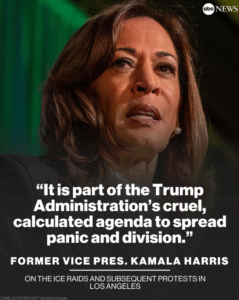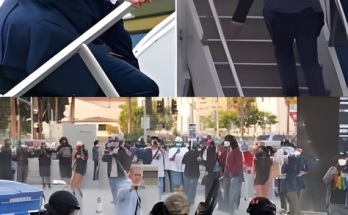
Context: ICE Raids & Rising Tensions in L.A.
Starting June 6, large protests erupted across Los Angeles following a series of surprise ICE raids targeting immigrant communities—//including workplaces and day labor centers//—resulting in dozens of arrests . The protests, once largely peaceful, escalated: demonstrators blocked streets and highways, leading to confrontations with law enforcement using tear gas, flash‑bangs, rubber bullets, and declaring unlawful assemblies .
In a significant escalation, former President Trump authorized the deployment of approximately 2,000 National Guard troops—initially around 300 in downtown—and positioned around 500 Marines on standby . The Pentagon estimated the operation could cost up to $134 million over 60 days
Harris Speaks Out: “Dangerous Escalation,” “Provoking Chaos”
On June 8–9, former Vice President Kamala Harris sharply criticized this federal deployment:
-
She called it a “dangerous escalation” and “calculated agenda to spread panic and fear,” accusing the Trump administration of deliberately provoking chaos
-
Harris emphasized the largely peaceful nature of the protests, calling them “overwhelmingly peaceful” and a “powerful tool for justice,” rather than security threats
-
She highlighted that the deployment was authorized under Title 10, bypassing the authority of Governor Gavin Newsom, and labeled it as both a breach of state sovereignty and an abuse of executive power
Harris framed the federal action as politically motivated, aimed at intimidating citizens—especially immigrant communities—rather than ensuring safety. She expressed that the response “stoked fear” and targeted civil liberties, undermining democratic norms
Alignment with California Leaders
Her criticism echoed voices across California’s leadership:
-
Governor Gavin Newsom called the deployment “unlawful”, pledged to sue the federal government, and accused the White House of inflaming tensions
-
L.A. Mayor Karen Bass described the raids as sowing “terror in our communities”, defended the right to peaceful protest, and denounced the federal stance as inflammatory Human rights voices like trans activist Jen Richards detailed harrowing encounters with LAPD flash‑bangs and rubber bullets, urging scrutiny over militarized responses
The Broader Implications
Harris’s stance carries weight far beyond L.A.:
-
Federal‑state tension: The deployment without state approval raises serious legal questions under the Insurrection Act and Title 10—potentially setting precedents for federal intervention in domestic unrest .
-
Civil liberties vs. security: Harris argues that using military force against protestors, many of whom are immigrants defending constitutional rights, endangers civil rights and intensifies social fissures .
-
Political optics: For Democrats and progressive advocates, this moment highlights a choice: will the U.S. default to militarized federal responses or recommit to de‑escalation, negotiation, and local governance?
What’s Next?
-
Legal challenges are likely: Newsom’s threatened lawsuit may force federal courts to interpret Title 10’s role in civil unrest.
-
More protests may unfold if ICE operations continue—Harris explicitly supports the right to peaceful assembly and pledges ongoing advocacy.
-
This incident is fueling national dialogue over the proper boundary between federal power and citizen rights amid domestic dissent.
 Bottom Line
Bottom Line
Kamala Harris’s condemnation of Trump’s L.A. troop deployment underscores deep concerns over federal overreach, militarization of civil protest, and the safety of immigrant communities. As legal battles loom and protests persist, this clash emphasizes urgent questions about democracy, state-federal balance, and firsthand civil liberties under pressure.
